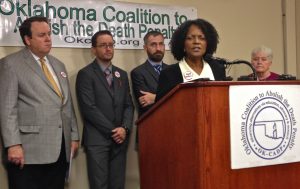
Patrick B. McGuigan, editor
, The City Sentinel
Wednesday, May 26, 2016
OKLAHOMA CITY – The leading group organizing continued opposition to the state’s use of executions as a means of punishment held a major press conference at the Oklahoma state Capitol the morning after the multi-county grand jury presented a lengthy report about its deliberations.
The Oklahoma Coalition to Abolish the Death Penalty (OK-CADP) event drew five television cameras and representatives of most major news organizations in the state.
Former state Sen. Connie Johnson, now chairperson for the coalition, kicked off the press briefing held at the Capitol broadcast press room.
She joined other participants in responding to questions. Johnson thanked the grand jury for its lengthy service, and noted that the panel indicated some work remained before the group formally ends its investigation.
The coalition leaders said that were it not for Richard Glossip, the issues with Oklahoma’s executions might never have been known.
Don Heath, OK-CADP vice chair, said the “chain of custody” for the lethal drugs used in executions remains vague and unclear. He encouraged the grand jury to hear from additional witnesses – “from the outside,” including defense attorneys – who are not part of the Department of Corrections.
State Rep. George Young, D-Oklahoma City, stepped away from the House floor long enough to address the reporters. Young, also a minister of the Gospel, decried the “foolishness” he said characterized the 2016 legislative session. He specifically decried continuance of capital punishment in the Sooner State. “God says ‘Thou Shalt Not Kill,’ and that’s good enough for me.”
Another featured speaker was former Democratic state Rep. Ryan Kiesel, now executive director for the American Civil Liberties Union (ACLU) in Oklahoma. He said the state was suffering through “a circus of political and administrative incompetence.”
As a lead exhibit, he pointed to information in the grand jury report. He told reporters, “The numbers are growing, of Oklahomans who do not trust the government with this ultimate power.” He said the grand jury’s work brought the state “one step closer to abolition” of capital punishment.
Attorney Brady Henderson, the ACLU legal director, pointed to the process that nearly led to the execution of Richard Glossip. “Oklahoma came close to murdering one of its own citizens.”
Henderson shared the dismay of Judge Donald Deason, presiding judge for the panel, who described the state’s fouled up process as “monkey business.” The near-execution of Glossip was, at best, “only slightly better than the Keystone Cops,” Henderson said.
Henderson also offered insights into the state’s dysfunctional execution protocols and poor administration of the process. He detailed the history of the ultimate sanction in Western law, saying, “We should not have anyone doing this job.” He encouraged state leaders to “do what we wish people on death row had done – to value life.”
Henderson, a registered Republican, said if he could gain the ears of Attorney General Scott Pruitt and Governor Mary Fallin, he would encourage “an open-ended moratorium” on the death penalty, as prelude to a permanent and indefinite suspension of its use.
OK-CADP spokesperson Rev. Adam Leathers also addressed the packed room of journalists. He reflected, “by now, most of us have either read or heard about the findings of the grand jury. It does indeed appear a lot of mistakes were made. More importantly, it is evident the vast amount of resources we as a state have put into the death penalty process.
“We know that it is more expensive to put someone to death than it is to keep someone in prison for life. That is a fact, not an opinion. Right now, our state’s budget shortfall is over $1 billion, so imagine how much we have already wasted on this issue.
“How many teachers, those in higher education, social workers, state employees have been laid off and can’t find work because of the massive cut?”
Leathers continued, “Our economy is flat-lining, and our state is really in debt, and yet we spending on killing. Is that honestly the right place to direct our resources? Is that what Christ would have us do?
“Abolition is the sensible thing, it is the right thing, it is the moral thing and it is the inexpensive thing. For the state of our state’s future and our soul, let’s just abolish it.”
Rex Friend, a Quaker, joined Rev. William Tabbernee in representing the Oklahoma Conference of Churches (OCC) at the encounter with reporters. Friend said he had known Steve Mullins, Gov. Fallin’s legal counsel, for decades in legal circles, and considered him a good man.
Yet, he said, Mullins had “put himself above the law’ in pressing for the execution of Richard Glossip to proceed on September 30, 2015, after it was clear the Corrections agency did not possess the approved drugs for the legal injection process. Friend said, “At every level, the system was flawed and failed.” He pointed to a Scriptural analogy, saying officials had erred in departing from their own protocols: “You can’t put new wine in old wineskins.”
Rev. Tabbernee called for “an indefinite and then a permanent moratorium on executions in Oklahoma.”
Both Heath and Johnson, with support from other attendees, encouraged popular opposition to State Question 776, a legislatively-referred ballot measure that would enshrine the death penalty into the state constitution and approve alternative means for carrying out executions.
In related news, attorney Don Knight, co-lead counsel for Glossip, said he and co-counsel Mark Olive continue to seek new evidence that will exonerate their client:
“As we have said from the beginning, regardless of how one feels about the death penalty, we can all agree no one wants to execute an innocent man.”
Read The City Sentinel article here.
Listen to audio from the full press conference, courtesy of Rena Guay, here.
Read the Interim Grand Jury Report findings here.
Tags: Charles Warner, death penalty, lethal injection, Oklahoma mutil county grand jury, Richard Glossip